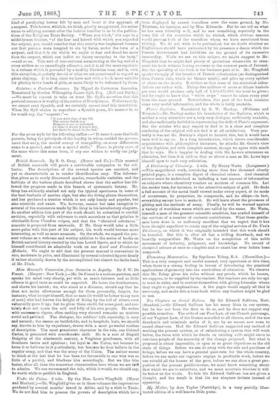Miss Raveners Conversion from Secession to Loyalty. By J. W.
De Forest. (Harper : New York.)—Mr. De Forest is a zealous partizan, and speaks his mind very clearly, yet with as much fairness and as little offence to good taste as could be expected. He hates the Southerners, and shows his hatred ; we, who stand at a distance, should say that he does not make allowances enough for them personally, forgets, for instance, what he says himself, that no man (it would be better to say race of men) who had known the delight of living by the toil of others ever voluntarily gave it up; but he gives them credit for some good, and cer- tainly does not spare the evil and folly of his own people. He writes with uncommon vigour, often making very shrewd remarks on matters social and political. The dialogue, the soldiers' talk especially, is easy and natural; the scenes on battlefields, and in hospitals, both, we should say, known to him by experience, drawn with a most powerful realism of description. The most prominent character in the tale, one Colonel Carter, is presented with considerable skill. He is a sort of Dugald Dalgetty of the nineteenth century, a Virginian gentleman, with all Southern tastes and opinions ; but loyal to the Union, not because he loves it or believes in it particularly, but because he does believe in the regular army, and that was the army of the Union. The author seems to think at the last that he has been too favourable to one who was so little of a patriot, and blackens him accordingly. But we like him bettor, after all, than the somewhat characterless hero whom we are told to admire. We can recommend the tale, which it would, we should say, be worth while to publish in England.


































 Previous page
Previous page